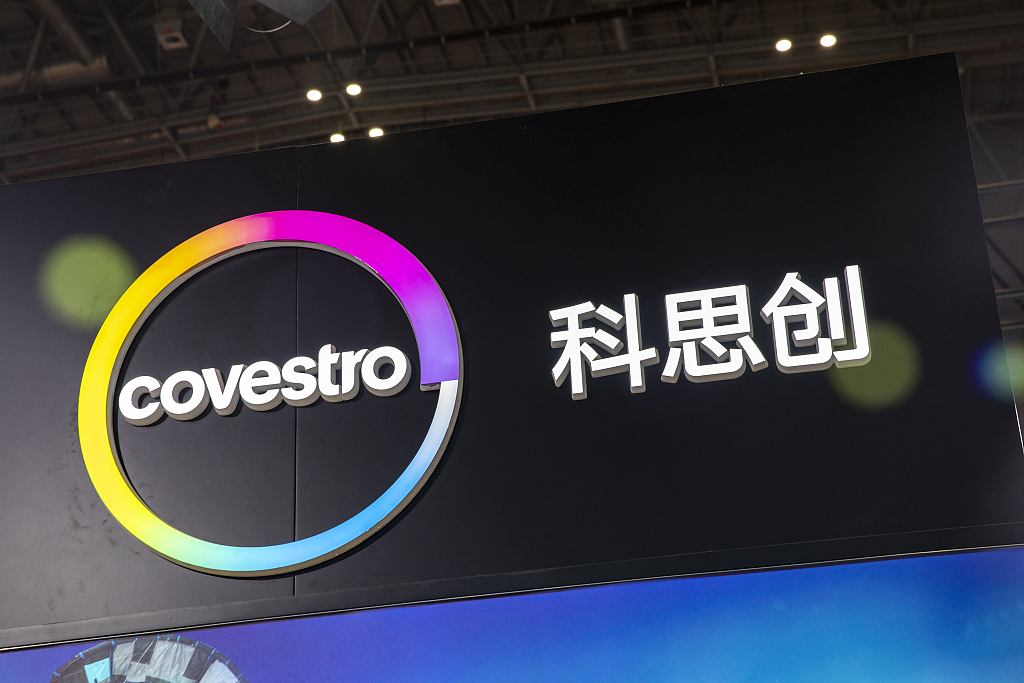
A sign of Covestro is seen at an expo held in Shanghai, 2022. [Photo/VCG]
About 75 percent of Covestro AG's planned investment in the Asia-Pacific region will be directed to China over the next three years, said the CEO of the German manufacturer of polymers and high-performance plastics.
Without revealing the specific investment figure, Markus Steilemann said that Covestro is currently building a plant for manufacturing thermoplastic polyurethanes in Zhuhai, South China's Guangdong province, with an annual production capacity of 120,000 metric tons by 2033.
"This marks the largest TPU site in our global portfolio to date. It demonstrates our commitment not only to investing in large sites with base chemicals, but also to expanding our specialty portfolio in China," said Steilemann.
Since the second half of last year, the Leverkusen-based group inaugurated several new production facilities at its integrated production site in Shanghai. Among these are a new elastomers plant, a production facility for polyurethane dispersions, and notably, its first mechanical polycarbonate recycling line, boasting an annual capacity of 25,000 tons.
Covestro invested over 4 billion euros ($4.3 billion) in China by the end of 2023. The German executive said that for multinational corporations like Covestro, many opportunities will be unleashed by the country's dual carbon goals, booming automotive and high-end manufacturing businesses, the ongoing industrial upgrade and Chinese companies' accelerated steps to go global in the years ahead.
"The Chinese market contributes 20 percent of Covestro's global sales. These figures have already told us that the Chinese market cannot be ignored," said Steilemann, who joined German Chancellor Olaf Scholz during his visit to the company's Asia-Pacific Innovation Center in Shanghai in April.
Noting Covestro's active role in China's opening-up process, Steilemann highlighted how its extensive global presence enables effective assistance to Chinese companies in their international expansion efforts.
For example, Covestro's partnership with Jiangsu Xinquan Automotive Trim Co underscores its dedication to aiding Chinese firms in their global endeavors. Through supply of polyurethanes to Xinquan's new plant in Mexico, Covestro supports the Chinese company's growth in the North American market.
Amid heightened global environmental consciousness and stricter regulatory standards, the automotive industry is recognizing the imperative of plastic recycling for sustainable progress. Covestro, along with partners throughout the automotive value chain, has been promoting the concept of car-to-car closed-loop plastics recycling.
This initiative is emerging as a promising solution to the pressing challenges of plastic waste management in the sector.
The pilot program, unveiled during CHINAPLAS 2024 — an international plastics and rubber trade fair held in Shanghai in late April — boasts notable partnerships with automakers such as China's NIO and Germany's Volkswagen, as well as third-party certification bodies like TUV Rheinland.
Steilemann voiced confidence that China's visa-free policy for a number of European countries, including Germany and France, will encourage more Europeans to travel to China, enabling more business exchanges.
German companies aim to leverage China's innovation system not only to seize growth opportunities, but also to maintain their competitive edge, said Maximilian Butek, East China executive director of the German Chamber of Commerce in China.
Following China's announcement that it has lifted all restrictions on foreign investment in the manufacturing sector and implemented measures to ensure equal treatment for foreign-funded companies, China's high-tech manufacturing sector attracted 12.5 percent of all foreign direct investment in the first quarter, up 2.2 percentage points year-on-year, said the Ministry of Commerce.
The China Council for the Promotion of International Trade said it surveyed more than 600 foreign companies operating in China in the first quarter and found more than 70 percent of them were optimistic about development prospects in the Chinese market over the next five years, in spite of uncertainties and challenges ahead.
The figure was up 3.8 percentage points quarter-on-quarter, according to a survey report released by the Beijing-based CCPIT in late April.